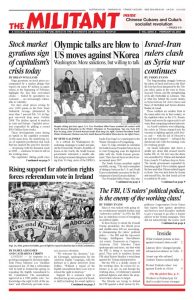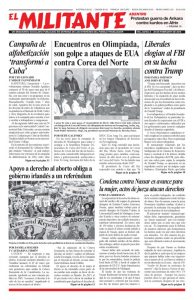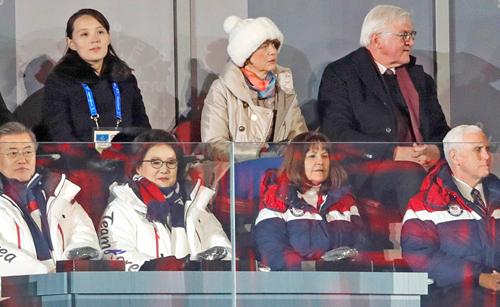In a setback for Washington’s decadeslong campaign to isolate and punish the Democratic People’s Republic of Korea in the North, the South Korean government welcomed a sizable athletic and government delegation, including Kim Yo Jong, sister of the DPRK’s leader Kim Jong Un, to participate in the Winter Olympics in Pyeongchang.
Kim Yo Jong extended an invitation for South Korean President Moon Jae-in to visit Pyongyang soon for high-level talks with the North Korean government. There has not been an inter-Korean summit since 2007.
The South Korean president replied carefully, saying, “The early resumption of dialogue between the U.S. and North Korea is absolutely necessary for the development of inter-Korean relations.”
Vice President Mike Pence, who also attended the Olympics, shunned all contact with the North Korean delegation. But on his way back from Pyeongchang, he told the press that if North Korea wants “to talk, we’ll talk.”
At the same time, “the maximum pressure campaign is going to continue and intensify,” Pence said, referring to draconian sanctions imposed on North Korea by Washington, until DPRK leaders “are actually doing something that the alliance [of Tokyo, Seoul and Washington] believes represents a meaningful step toward denuclearization.”
He said Washington was planning another round of yet harsher sanctions. The U.S. rulers have succeeded in getting the U.N., China and other capitalist governments to join in the pressure.
Even as Washington tightens the economic screws on North Korea, President Donald Trump agreed to Moon’s request to postpone provocative annual joint U.S.-South Korean military war games until after the Olympics and following Paralympic Games end. This removed the last obstacle to a united Korean team. The war games are scheduled to begin in April, but South Korean daily Hankyoreh reported the government is considering proposing to reduce their scale and duration.
Washington also agreed with South Korean leaders to temporarily lift some sanctions for the Olympics, including a ban on international travel for North Korean sports officials.
Since 2016, the United Nations Security Council at U.S. urging has approved five resolutions that impose some of the toughest sanctions in the world on the Democratic People’s Republic of Korea, in addition to the even harsher unilateral U.S. sanctions. These restrictions hurt working people the most.
U.S. provokes Korean War
Korea was split in two by Washington, with the connivance of Moscow, as the second imperialist world war wound down in 1945. The war ended with Washington dropping atomic bombs that devastated Hiroshima and Nagasaki in Japan, the only time nuclear weapons have been used.
As workers and peasants in the north carried through a social and political revolution, the U.S. military crushed a popular movement in the south, killing tens of thousands. In 1950 Washington provoked what became the Korean War. As U.S. forces drove into the north, the Chinese government sent troops to aid the Koreans. In April 1951 President Harry Truman sent nine nuclear bombs to Okinawa for use against North Korean and Chinese troops.
The U.S. rulers ultimately decided not to use them. What stopped Washington wasn’t fear of nuclear retaliation — neither China nor North Korea had atomic bombs — but fear of the political cost they would pay because of the deep opposition of working people around the world to nuclear weapons.
Even without nuclear weapons, Washington’s war left North Korea devastated, with more than 4 million dead, including 2 million civilians.
With help from Beijing, U.S. forces were pushed back to the 38th parallel, dealing U.S. imperialism its first ever military defeat.
That resistance enabled the North Korean people not just to fight the U.S. rulers into a stalemate, but to hold the moral high ground.
In the face of unrelenting U.S. hostility for more than 80 years — including U.S. refusal to sign a peace treaty after the war, a refusal that stands today — the North Korean government says that having a nuclear arsenal is crucial to protect the country from a U.S. nuclear strike.
But the development and possession of those arms over the last several years — and threats by the DPRK government to turn South Korea and the United States into “a sea of fire” — have given Washington a handle to turn history on its head and claim that North Korea is the threat to the world, not U.S. imperialism.
The Socialist Workers Party joins the Korean people to call for a nonnuclear Korean Peninsula and Pacific, and demands the U.S. rulers unilaterally destroy their entire nuclear arsenal today!


